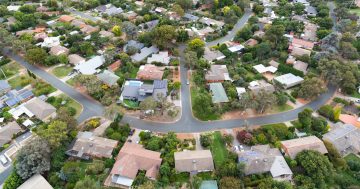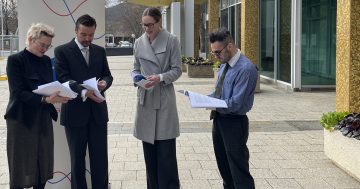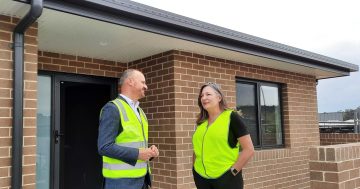
Shane Rattenbury and Caroline Le Couteur at the Housing and Homelessness Summit. Photo: Supplied.
As this week is Anti-Poverty Week, it is an important opportunity to highlight how poverty can make it all but impossible to find adequate housing here in Canberra. The latest cost of living report by the ACT Council of Social Services reveals that approximately 10,000 households in the ACT are suffering from housing stress and 1,785 of us are homelessness.
Homeless people are not just the rough sleepers you may see in Civic. Several older women I know are homeless, but manage the situation through long term house sitting—moving from place to place because they cannot afford adequate accommodation any other way. As one in eight Australians will be homeless at some point in their life, I bet that most Canberrans know someone who doesn’t have a secure place to call home.
While more Canberrans than ever before are renting privately, fewer of us are able to rent public housing. The 2016 the census showed that 23.4% Canberrans rent privately, up from 19.3% in 2006. It also showed that public housing supply just has not kept up with our rapid population growth, with only 6.5% of Canberrans able to rent social housing, down from 8.3% a decade earlier.
Housing is changing in Canberra, even for those with somewhere to call home for now. For low income renters the situation is grim. The latest rental affordability snapshot undertaken by Anglicare in April this year showed that out of 1280 rentals advertised, not one was affordable to a single person living on newstart or youth allowance. Without adequate, affordable, safe, and secure housing it is very hard to get or keep a job, send your kids to school and look after your health.
Housing remains the biggest cost of living issue for households, so what can be done? The Greens believe that it must be addressed as a policy priority, which is why our Parliamentary Agreement (PA) with ACT Labor includes a suite of policy changes to reduce homelessness and poverty caused by the cost of housing in Canberra.
The PA includes a diversity of policy options because we know there is no one simple solution to solving housing stress. Some measures, like addressing negative gearing and capital gains tax reductions which make property investing so attractive, are in the hands of the Federal Government. But the ACT Government and the ACT community can and must act as well. We need to be innovative and courageous. We need to develop solutions for renters as well as buyers, for families and singles, and for older and younger people.
As a start, we need to grow our public housing stock to keep pace with our increasing population. Because without adequate public housing, those on low incomes in our community will never get out of the cycle of poverty. Housing stress will continue – either by having to pay unaffordable rents, or in worse cases by being homeless.
We also need to grow the community housing sector with new, energy efficient and socially inclusive homes and neighbourhoods. Community housing gives Canberrans who are not eligible for public housing, but are financially locked out of the private rental market, a fair go but not a hand out. This may include downsizers. Community housing can also provide a transitional option for low income individuals and families saving to buy their first home. We need to promote shared equity schemes to offer those with limited incomes a chance at ownership. We need to encourage community support for initiatives such as Safe Shelter, a group of inner city churches which offer shelter to men over the winter months.
The PA also commits to supporting community initiatives similar to Melbourne’s not-for-profit real estate agency HomeGround. HomeGround gives socially minded investors the option to rent out their property at a reduced rent to tenants who need that support. This model is already operating in Canberra via the Migrant and Refugee and Support Service, which is providing housing for refugees. The Homeshare scheme, again operating successfully in Melbourne and to a limited extent in Canberra, matches people in larger houses with spare rooms who need support with people who would benefit from reduced-rate housing and can provide assistance around the home. This is another PA commitment and another piece of the affordable housing puzzle.
In June this year, I secured an agreement for the ACT Government to develop a demonstration housing precinct to showcase best-practice affordable housing options—from compact to larger homes. These demonstration homes will be adaptable and energy efficient, modelling how sustainable dwellings can reduce energy use and hence the cost of utilities for occupants.
With the ACT Government’s housing and homelessness summit taking place on Tuesday — another PA commitment — I was pleased that the Government committed to the first annual affordable, public and community housing supply target. I look forward to learning more about these targets, as committing to a quota of community housing and public housing in any future development is one of the Government’s obligations under the new legislation for the Suburban Land Agency and City Renewal Authority. These targets must be achieved and should grow over time to ensure Canberra’s new developments should are for all of us, not just the well off.
In these diverse and innovative ways we have the opportunity to build a fair and equitable city and break the cycle of poverty. The Greens look forward to the real work on these initiatives getting underway so we can start to realise our vision of safe, secure and affordable housing for all Canberrans.





















